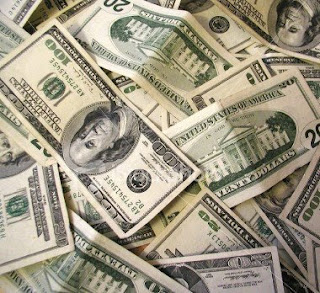
I heard an idea recently on the radio that made a lot of sense that I have yet to find much of a flaw with. The concept is to do away with the personal income tax and switch to a uniform increase in sales tax that will accomplish the same principle, yet to a greater and more all-encompassing magnitude. The main advantage to this concept is that it incorporates 100% of the US population versus the, roughly (and conservatively), 50% that currently report and pay personal income taxes.
As I see it, this structure would be a uniform, proportionate and non-discriminating structure that would alleviate the painful, time-consuming and expensive process by which most law-abiding citizens currently go through come April of each year. It almost seems way too simple. This probably explains why I'm either way off-base or the government is evidently resistant to the idea.
To simply do away with the personal income tax filing method in favor of a increased sales tax, no one is exempt. The rich can't search for loopholes or other tactics by which to avoid paying the piper. The middle-class chips in in the same blue-collar way they most likely currently do. The poor aren't exempt because of failing to file personal income taxes altogether or other entitlements that might be extended by the government. The illegal immigrants pay into the system regardless of their green card status. Men, women, children alike share in the responsibilty. No dependents. Your kid buys a pack of baseball cards, they're in - just like everyone else.
The basis is simple: You live here, you pay your share. You buy something, you contribute - whether you like it or not. If you can afford it (or should I say, even if you can't), you are carrying your weight with society. Want a cell phone? Pay the price - plus, say, 15% - 20%. Want to get your nails done? It's no longer $30.00 - it's $36.00. Seems nominal doesn't it?
What we would lose in the revenue generated from 50% of people paying their personal income tax would be more than made up for by 100% of the people paying an increased sales tax. No? I think so.
Now, we currently have a sales tax structure in place (6%) that serves this purpose to some extent. However, it's hardly enough to cover our national spending budget. In these times, when we're bailing out GM, Citi, AIG and the like, 6% is not only not enough but it still doesn't alleviate the need for the government to collect from responsible citizens. And even THAT still isn't enough. Seems like change is needed in this battle.
The fact is, the current system is set up for the rich to contribute the most (I think the stat is something like 1% of the population contributes 80% of the revenue generated by the personal income tax) and as the income level decreases, so does the obligation - the more you make, the more they take! Hardly reasonable or motivation to go knock it out of the park. As well, this won't necessarily go away by increasing the sales tax in lieu of ridding ourselves of the personal income tax. After all, the rich can afford more "stuff" and they buy more "stuff." Therefore, they will continue to pay in more to the system than anyone else. However, the playing field is level for everyone and your contribution is only determined by what you can afford - or choose to spend. No more of the guy that has a cell phone, a kick-ass stereo, 24" rims, low-profile tires and an iPod but evidently doesn't make enough to pay income taxes.
Corporations would adhere to the same policy. Buy inventory, pay as you go. Buy a machine, pay as you go. Buy a building, pay as you go. No loopholes. No need to pay quarterly or speculate and save for the end of the year only to find out that you're short. Pay as you go. Simple math that applies across the board.
Where is this unfair?
You make $45,000 and buy $30,000 worth of goods, you pay in $6,000. You make $2,500,00 and buy $1,000,000 worth of goods, you pay in $200,000. Seems perfectly proportionate to me. As well, unless you steal in order to avoid the consequences of paying the increased sales tax, it's a self-monitoring system. No longer would the IRS have to perform countless hours auditing individuals and companies to get to the bottom of how they might be sheltering income through shell corporations, LLC's or off-shore accounts.
There is a minor downfall with adopting this system as it would seemingly come at the expense of a number of jobs. The IRS wouldn't need the same number of employees to process the paperwork. Accountants and CPA's would, by-and-large, be put out of business. However, the people that hold these positions are bright-minded people. They're resourcesful. They have options. It's not like they are specially trained to weld or hang drywall with no other tools. Their knowledge and business accumen would surely be in demand in some other area of business commerce. Hell, now that the government is collecting from 100% of the population, they could even afford to give these people a severence package to cover them for a certain period of their pending unemployment while they seek alternative employment.
The positives sure seem to outweigh the negatives as I see it. You?
Try it for a year, see what happens. I have to think we would like the result.
But what do I know?
No comments:
Post a Comment